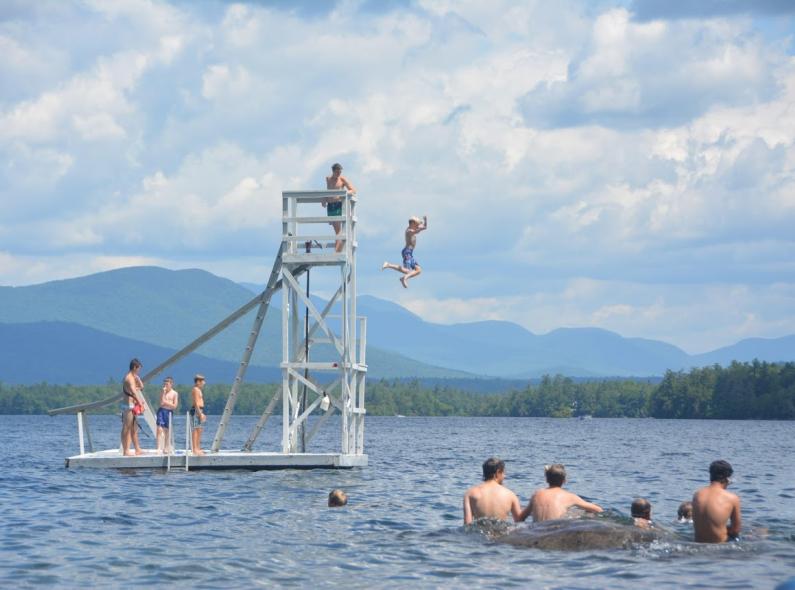By GARRY RAYNO, InDepthNH.org
CONCORD — Parents looking for summer camps for their children will have few to pick from and almost none with overnight accommodations.
The coronavirus has taken its toll on New Hampshire’s 160 plus summer camps that have seen an 80 percent reduction in their revenue stream, the Legislative Advisory Committee of the Governor’s Office for Relief and Recovery was told Wednesday.
Trying to make it to 2021 will be a challenge, said Ken Robbins, president of the New Hampshire Camp Directors Association.
The safety guidelines developed so camps may reopen will keep many from opening because of the changes that need to be made, he said.
Robbins said Camp Kabeyun in Alton, where he is director, will not open for the first time in 97 years.
The guidelines are extremely challenging but are prudent and needed for the safety of the campers and staff, he said, but present a dilemma.
The cost of screening for COVID-19, needed physical modifications and health care guidelines which would require doubling or tripling nursing staff, would cost the camp more to open than staying closed, Robbins told the committee.
In a recent survey, he said, 17 percent of camps that responded said they are likely or very likely not to open again.
“The loss of just one camp is tragic,” Robbins said, noting he first went to Camp Kabeyum when he was 11 years old.
“It’s an enormous part of who I am,” he said, “it is a part of growing up and a child’s social and emotional development.”
Robbins said he has not known a time when the camps experience is more important than today to help children heal and become part of a community again.
“The mental health of children locked up since March is problematic, said committee member state Sen. Lou D’Allesandro, D-Manchester, “and something like the camping experience is needed.”
He noted his grandchildren have gone to summer camp and are very upset they won’t be going this year.
“Camps have an enormous impact on our state and our communities,” D’Allesandro said, urging Robbins to provide the committee with an estimate of what it would cost to sustain the camps and the cost of modifications needed to open next year.
Robbins said camp officials do not believe COVID-19 will be just a one season occurrence and are planning the changes needed to open next year.
He said his camp has about $500,000 in fixed costs like property taxes, utilities, and payroll and no revenue this year. Camps are not like other businesses that can make up the revenue in the third or fourth quarter with an improved economy, he noted, camps have to wait until the second quarter of 2021 before revenue begins flowing again.
“We don’t want a bailout,” Robbins said, but noted making it to the 2021 season is going to be very challenging.
Camps simply would like similar opportunities other businesses and nonprofits have to help weather the coronavirus storm, he said, but does not see relief programs where they might be eligible.
GOFERR staff said the for-profits camps could have applied under the Main Street Relief Fund, but that deadline passed, and the nonprofit camps would be eligible for that program which is still accepting applications.
Robbins said he could not give an estimate for what camps would need, because each camp is different, but he would contact camps to determine a figure and send that information to the committee.
University, Community Colleges
D’Allesandro wants the committee to discuss additional funding for the university and community college systems as they prepare to welcome students back to campus this fall.
He said while the private colleges and universities were given $15 million, the university system received $10 million and the community college system $5 million.
He said there will be considerable expense to the public schools when they reopen for testing students, faculty and staff.
The public colleges and universities are critical to the state’s economy and he believes more CARES Act money ought to go to public higher education to help with reopening costs, D’Allesandro said.
The topic will be discussed at the committee’s next meeting either Friday or Wednesday next week.
Area Agencies
The committee also wants to discuss avenues for helping the area agencies that provide services to the developmentally disabled.
Some qualified for the payroll protection program but the North County agency did not.
Committee member Mary Jane Wallner, D-Concord, said she would pass on information she received from the agencies to the GOFERR staff as they determine which relief programs might apply.
The legislative committee was created by Gov. Chris Sununu to advise his office for relief and recovery on how to spend $1.25 billion in federal CARES Act funding the state received.
To date all but about $350 million has been allocated in aid programs ranging from healthcare to private businesses.
The money has to be spent by the end of December or the state has to return what remains to the federal government.
Garry Rayno may be reached at garry.rayno@yahoo.com.





